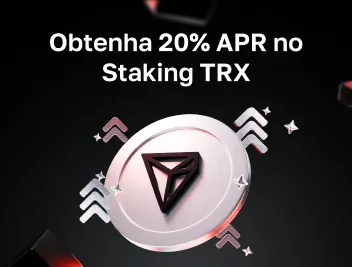
Banco de criptomoedas: entendendo o futuro dos serviços bancários na era da moeda digital
Índice
Os bancos especializados em criptomoedas são serviços ou instituições que fundem funções bancárias padrão com criptomoedas. Normalmente oferecem uma ligação entre os sistemas financeiros estabelecidos e o domínio crescente das moedas digitais.
O crescente interesse das pessoas pelas criptomoedas, especialmente em 2024, levou a um avanço acentuado na adoção destas moedas digitais para transações, tanto por indivíduos como por empresas. Esta tendência apoiou o surgimento e o estabelecimento de criptobancos.
No artigo de hoje veremos o que é um banco de criptomoedas, como funciona e como escolher os melhores bancos para criptomoedas.
O que é um banco criptografado?
A definição de bancos criptografados pode variar dependendo das necessidades pessoais, mas alguns elementos podem ser semelhantes para todos, e aqui estão alguns deles:
-
Suporte para transações de criptomoeda: Os bancos que oferecem suporte a moedas digitais fornecem serviços para os clientes gerenciarem suas transações com esses ativos. Isso inclui comprar, vender e reter diversos tipos de dinheiro digital.
-
Bancos e criptomoedas: Esses bancos combinam serviços normais, como contas correntes, poupança, empréstimos e envio de dinheiro para o exterior, com formas de usar dinheiro digital. Isso ajuda as pessoas a lidar com as necessidades diárias de dinheiro e com o mundo do dinheiro digital.
-
Serviços de conversão: Eles ajudam a converter dinheiro normal, como dólares ou euros, em dinheiro digital e vice-versa. Isso ajuda os investidores regulares a entrar no mundo criptográfico com mais facilidade.
Papel dos Crypto Banks no Ecossistema Financeiro
O banco de criptomoedas está se tornando cada vez mais importante nas finanças, especialmente à medida que os serviços bancários regulares começam a se misturar mais com o mundo crescente das moedas digitais.
-
Facilitando a adoção de criptomoedas: Um banco de criptomoedas serve como um elo entre o cenário bancário normal e a esfera da moeda digital. Ao oferecer serviços bancários familiares, eles desempenham um papel fundamental para tornar as criptomoedas menos intrigantes e mais amplamente aceitas.
-
Serviços bancários para empresas de criptomoedas: Os bancos regulares muitas vezes evitam trabalhar com empresas de criptomoedas devido a regras e riscos. No entanto, os criptobancos aceitam-nos e oferecem-lhes a possibilidade de estas empresas criptográficas terem acesso ao sistema bancário.
-
Conformidade e Regulamentação: O banco Crypto desempenha um papel crítico na compreensão das regras complicadas em torno das criptomoedas. Eles garantem que todas as atividades sigam as leis financeiras estabelecidas e se ajustem às novas. Isto apoia a confiabilidade e a estabilidade do mercado criptográfico.
Principais recursos dos bancos criptográficos
Os bancos criptográficos combinam serviços bancários tradicionais com os recursos inovadores do mundo das criptomoedas e oferecem um conjunto único de características. Aqui estão alguns dos recursos críticos dos bancos criptográficos:
-
Transações de criptomoeda: Essas plataformas facilitam a troca de moedas digitais, incluindo a compra, venda, transferência e manutenção segura de diversas formas, como Bitcoin e Ethereum.
-
Serviços fiduciários e criptográficos: Os bancos criptográficos diferem dos bancos padrão por oferecerem serviços para dinheiro tradicional, como dólares ou euros, bem como moedas digitais. Este serviço duplo permite trocas tranquilas entre ativos tradicionais e digitais.
-
Empréstimos garantidos por criptografia: São empréstimos em que criptomoedas são usadas como garantia. Os indivíduos podem receber moeda tradicional como empréstimo, oferecendo suas participações em moeda digital como garantia, permitindo-lhes manter a propriedade de seus ativos criptográficos.

Vantagens e desafios dos bancos criptográficos
A maioria dos bancos amigos das criptomoedas opera na intersecção entre bancos tradicionais e tecnologias emergentes, apresentando um conjunto único de vantagens e desafios.
Vantagens
-
Inovação em serviços financeiros: Os bancos com criptomoedas estão liderando o caminho ao incorporar blockchain em sistemas bancários clássicos, introduzindo novas ofertas que vão além do que os bancos típicos oferecem.
-
Segurança aprimorada: O design do Blockchain aumenta a segurança das trocas e informações financeiras por meio de sua estrutura distribuída e criptografia avançada.
-
Acessibilidade Global: Esses bancos atendem clientes em todo o mundo, normalmente enfrentando menos restrições do que os bancos convencionais. Este aspecto é particularmente significativo para aqueles que vivem em áreas com acesso bancário limitado.
-
Custos de transação mais baixos: A tecnologia Blockchain pode reduzir os custos de transação, especialmente para transferências internacionais, eliminando intermediários e taxas de processamento típicas dos bancos tradicionais.
Desafios
-
Incerteza regulatória: As regras para criptomoedas ainda estão tomando forma, com leis diferentes em lugares diferentes. Isso torna difícil para o criptobanco permanecer do lado certo da lei.
-
Volatilidade do mercado: Os rápidos altos e baixos nos valores das criptomoedas podem ser arriscados para os bancos e seus clientes, afetando a estabilidade de seus ativos e serviços.
-
Riscos de segurança: Embora o blockchain seja seguro por design, os bancos on-line compatíveis com criptografia enfrentam ameaças de hackers e roubo on-line, bem como os detalhes técnicos envolvidos no manuseio de moedas digitais.
As futuras tendências e inovações na esfera criptográfica bancária
-
Finanças Descentralizadas (DeFi): As finanças descentralizadas, ou DeFi, permitem atividades financeiras na blockchain sem o controle de um grupo principal. E o banco de criptomoedas está começando a usar mais desses serviços DeFi.
-
Escalabilidade e eficiência aprimoradas: À medida que mais pessoas usam bancos que são compatíveis com criptografia, esses bancos precisam processar mais transações sem atrasos. Eles podem fazer isso usando tecnologia blockchain avançada que permite que muitas transações aconteçam ao mesmo tempo, como novas camadas adicionadas ao sistema existente, ou usando um método que permite aos validadores confirmar as transações com base nas moedas que possuem.
-
Medidas de segurança avançadas: Como as preocupações de segurança continuam sendo primordiais, espera-se que os criptobancos implementem tecnologias de segurança mais avançadas, incluindo autenticação multifatorial, biometria, criptografia resistente a quantum e soluções aprimoradas de armazenamento refrigerado.
Dicas para escolher o melhor banco criptográfico
Aqui estão algumas dicas para ajudá-lo a selecionar o banco certo na lista dos melhores bancos para criptomoeda:
-
Conformidade Regulatória e Licenciamento: Este é um dos melhores bancos online para especificidade de criptomoeda. Verifique se o criptobanco online segue todas as regras e tem as permissões corretas para trabalhar onde você mora. Certificar-se de que eles estão do lado certo da lei ajuda a manter seu dinheiro seguro.
-
Gama de serviços oferecidos: Pense em quais serviços você precisa. Isto pode ser negociar diferentes tipos de dinheiro digital, transformar dinheiro normal em dinheiro digital, contas que pagam juros, pedir dinheiro emprestado ou ajudar na gestão do seu dinheiro e investimentos.
-
Taxas e taxas de transação: Compare a estrutura de taxas para várias transações. Alguns bancos criptográficos podem oferecer taxas mais baixas para negociação ou saques, enquanto outros podem oferecer melhores taxas de juros para contas de poupança criptografadas.
-
Experiência do usuário e interface: Uma interface amigável é importante, especialmente se você for novo no setor bancário de criptografia. Verifique se a plataforma é fácil de navegar e se oferece recursos educacionais para os usuários.
Aqui estamos no final deste artigo que tratava do banco e da criptografia. Você pode nos deixar um comentário abaixo e compartilhar conosco sua opinião sobre este campo.
Simplifique sua jornada criptográfica
Quer armazenar, enviar, aceitar, apostar ou negociar criptomoedas? Com o Cryptomus tudo é possível — cadastre-se e gerencie seus fundos de criptomoeda com nossas ferramentas úteis.
Iniciar









